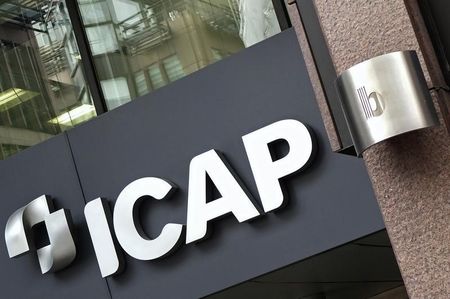LONDON (Reuters) - ICAP, the world's largest interdealer broker, said on Wednesday that group revenue in the first quarter fell 14 percent year-on-year, as tough market conditions continued to affect trading.
Revenue in its voice broking division fell by 19 percent due to a combination of both structural and cyclical factors including bank deleveraging, regulatory uncertainty and lack of interest rate and foreign exchange volatility, the company said.
Volumes in its BrokerTec electronic fixed income trading platform and its EBS currency trading platform fell 10 percent to $707 billion (412.5 billion pounds).
Interdealer brokers, whose staff match buyers and sellers of currencies, bonds and other tradable instruments, have been hit hard in recent years, as new regulations led their traditional investment bank clients to cut back on risky trading activities.
"Conditions are still very difficult, and we continue to mitigate these challenges by increasing the flexibility of our operating model, focusing on priorities and delivering cost efficiencies," ICAP Chief Executive Michael Spencer said in a statement.
ICAP has been trying to reposition its businesses towards electronic broking and post trade services. Electronic markets and post-trade risk and information businesses now accounts for two thirds of its operating profit. Post-trade includes middle and back office services such as trade confirmation.
Post trade risk and information saw double digit revenue growth in the first quarter reflecting customers' changing needs in a new regulatory environment, ICAP said.
The London-based group, which competes with Tullett Prebon, BGC Partners, GFI Group and Swiss-based Tradition, said its cost cutting programme was on track to deliver savings of at least 60 million pounds in the current year.
Sources told Thomson Reuters IFR last month that the broker has begun culling 100 staff from its voice broking division. It had already moved to lower costs by reducing compensation.
Chief Executive Michael Spencer said ICAP was in the process of a number of multi-year structural projects to revamp its corporate structure, making it more efficient and allowing more variability in its cost base.

"These will enable ICAP to continue to invest in products and services to drive future growth across the Group," he said.
(Reporting by Clare Hutchison, editing by William Hardy)
